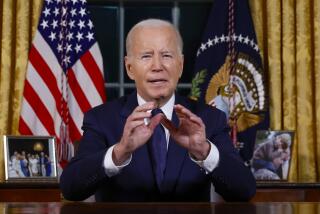Iraq War Not About Democracy
STANFORD — The interests of the United States and its closest ally, Israel, demand that Saddam Hussein be removed from Iraq before he develops nuclear weapons and his designs become unstoppable. Yet, a policy halfheartedly seeking to democratize the Arab world has no bearing on this imperative.
Few systems of government are less natural or appropriate for that region than Western democracy. To believe, as the administration has suggested in its policy statements, that a democratic phoenix will rise in Iraq from the ashes of war and set the stage for a regional pax Americana has no basis in history and is strategically dangerous. Such a notion not only fuels anti-Americanism, it also conveys the impression that we don’t respect Arab and Muslim governments.
In Islamic states and even in secularist Arab regimes, like the pan-Arabist Baath Party of Iraq and Syria, democracy and liberty do not naturally flow from local systems of government. Many Islamic leaders and thinkers regard the rule of men over men as the path of apostates, heretically violating the supreme control of Allah over all things. Perhaps that is why the Arab world, with the arguable exception of Turkey, has never embraced democracy, preferring monarchical or Islamic forms of government.
To change this anti-democratic bias would require nothing less than spending on the scale of the Marshall Plan to underwrite supporters and build a democratic infrastructure. It would entail decades of unprecedented commitment by U.S. forces and diplomats to the cause of nation-building, a practice that the Bush administration explicitly rejects.
Moreover, there would have to be a critical mass of individuals pushing their societies toward a democratic system to realize such a change. That’s highly unlikely, for two reasons. First, the Western way is largely anathema to Muslim life in the region. Second, the rising popularity of Islamic jihadism is evidence of the absence of countervailing democratic yearnings in the Arab world. A U.S.-led military campaign is not going to kindle such yearnings.
The only place in the region where a shift toward democracy may actually be underway is Iran.
Yet, reformers there have developed their ideas in response to oppressive Islamic rule, not because of United States agitation. The Iranian resistance, if successful, may finally answer the question of whether democracy with an Islamic face is viable, though the new government in Turkey, a mostly democratic state with an Islamic hard-liner, in effect, now at the helm, may give us a clue sooner. America, however, is incapable of crafting the answer.
Even if Iran did become a democracy, and even if there existed popular regional support for this historically unwelcome form of government, the task of keeping formerly autocratic states on a democratizing course would not be easy, demanding more work than America would ever be willing to do. Consider post-communist Europe. Although Vaclav Havel’s and Lech Walesa’s victories are more than a decade old, the region is still susceptible to the appeal of visceral authoritarianism, a far more familiar way of life there than democracy, which was without precedent in most of the former Soviet satellites.
One goal of European integration, once expanded to include Eastern and Central Europe, is to combat this undemocratic history. Membership in the European Union puts Eastern Europe on a democratic footing that is continuously reinforced through the integration process. As philosopher Jurgen Habermas observes, the power to establish normative “truths” lies increasingly with institutions, because citizens invest social capital in them and derive a despiritualized identity from them. As a result, forces pulling Eastern Europeans away from democracy are subordinated to the power of the institution. It is a system primed to facilitate Eastern European integration.
No such framework exists in the Arab world. If anything, the strongest source of “institutional” unity is the near-uniform loathing of Israel, a strain of commonality that begets anti-Americanism and militancy, not pro-Western democratic urges.
If we don’t want to find ourselves surrounded by angry bedfellows the morning after the war against Iraq ends, and if we want to preempt additional challenges to the credibility of our cause, our mission in Iraq should be recast as a tactical decision to depose a threatening dictator, not as a strategic vehicle to implement American democracy in the Arab world. Nothing less is necessary; nothing more is prudent.
What’s more, if we really desire to win over hearts and minds in the region, we must stop implying, much less asserting, connections between our form of government and divine design, as Bush did in his State of the Union message. In the Arab world, such claims are not construed as invitations to a better way of life, but as blasphemous insults to the fabric of the region’s history. It is a message that undercuts our strategic goals and endangers our security.
More to Read
Sign up for Essential California
The most important California stories and recommendations in your inbox every morning.
You may occasionally receive promotional content from the Los Angeles Times.










